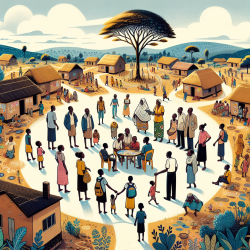Introduction
In the wake of prolonged conflict, communities often face a myriad of challenges, with mental health issues being among the most pressing. The study titled "Adolescent mental health in post-conflict communities: results from a cross-sectional survey in Northern Uganda" provides crucial insights into the mental health status of adolescents in the Lira District, a region deeply affected by the conflict between the Lord’s Resistance Army and the Ugandan government. This blog explores how practitioners can leverage these findings to enhance their understanding and improve mental health interventions in similar contexts.
Key Findings
The study reveals alarming statistics about adolescent mental health in Lira District:
- 66% of adolescents indicated poor well-being and potential symptoms of depression.
- 41% reported experiencing at least four childhood trauma events.
- During the COVID-19 lockdowns, 60% felt socially isolated, and over 35% felt extremely sad.
- Nearly half of the adolescents believed that witchcraft caused mental health problems, highlighting a significant gap in mental health literacy.
- 40% of respondents were unaware of where to seek mental health care, and few facilities offered mental health services.
Implications for Practitioners
Practitioners working in post-conflict settings can draw several lessons from this study:
- Enhance Mental Health Literacy: The misconception that mental health issues are caused by witchcraft underscores the need for educational initiatives to improve understanding of mental health among adolescents and their communities.
- Address Trauma: With a high prevalence of childhood trauma, practitioners should focus on trauma-informed care approaches to support affected adolescents effectively.
- Improve Access to Services: Efforts should be made to increase the availability of mental health services in schools and healthcare facilities, ensuring adolescents know where and how to access these resources.
- Community Engagement: Implement community-based participatory research (CBPR) methods to involve local youth in data collection and dissemination, fostering a sense of ownership and empowerment.
Encouraging Further Research
The findings from Northern Uganda emphasize the importance of understanding the political and social determinants of mental health. Practitioners are encouraged to conduct further research in their regions to identify unique challenges and develop tailored interventions. Collaborative efforts with local communities and stakeholders can lead to more sustainable and impactful mental health programs.
Conclusion
Addressing adolescent mental health in post-conflict regions requires a multifaceted approach that includes education, trauma-informed care, improved access to services, and community engagement. By applying the insights from the Lira District study, practitioners can enhance their strategies and contribute to the well-being of adolescents in similar contexts.
To read the original research paper, please follow this link: Adolescent mental health in post-conflict communities: results from a cross-sectional survey in Northern Uganda.










